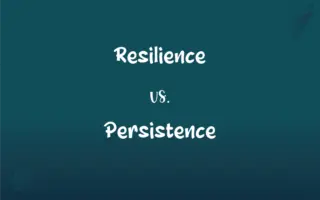Sensing vs. Intuition: What's the Difference?
Edited by Aimie Carlson || By Janet White || Published on November 26, 2023
Sensing involves perceiving through the five senses, focusing on present realities, while intuition is about perceiving patterns and possibilities, often focusing on future implications.

Key Differences
Sensing is the process of using the five physical senses to gather information about the present environment. Intuition, in contrast, involves understanding or knowing something without conscious reasoning.
Individuals who favor sensing pay close attention to facts and details they can directly observe. People with a preference for intuition often look for meanings, relationships, and possibilities beyond the immediate data.
Sensing leads to a practical and realistic approach to situations, based on actual experiences. Intuition guides one towards insights and innovative ideas, often independent of current reality.
Sensing is concrete and literal, focusing on what has been or what is. Intuition is abstract and theoretical, oriented towards future possibilities and what could be.
In decision-making, sensing relies on known facts and past occurrences, while intuition trusts gut feelings and hypothetical scenarios.
ADVERTISEMENT
Comparison Chart
Information Source
Five physical senses
Patterns, possibilities, internal insights
Focus
Present realities, actual experiences
Future implications, meanings beyond data
Approach
Practical, realistic
Innovative, insightful
Nature
Concrete, literal
Abstract, theoretical
Decision-Making
Based on facts and past experiences
Guided by gut feelings, hypotheticals
ADVERTISEMENT
Sensing and Intuition Definitions
Sensing
Sensing involves focusing on present, observable facts.
His sensing of details helped him excel in data analysis.
Intuition
Intuition is understanding without the need for conscious reasoning.
Her intuition about the startup's potential proved correct.
Sensing
Sensing is about concrete and literal interpretation.
His sensing of the contract's terms avoided misunderstandings.
Intuition
Intuition involves perceiving possibilities beyond immediate data.
His intuition led him to a breakthrough in his research.
Sensing
Sensing relies on direct experience in decision-making.
Her sensing of past market trends guided her investment decisions.
Intuition
Intuition guides towards innovative and abstract thinking.
Her intuition inspired a new approach to the marketing strategy.
Sensing
Sensing is perceiving through the five physical senses.
Her sensing of the different flavors made her an excellent chef.
Intuition
Intuition is oriented towards future possibilities and hypotheticals.
His intuition about market trends often predicted future demands.
Sensing
Sensing leads to a practical approach to situations.
Through sensing, she quickly identified the mechanical issue.
Intuition
Intuition trusts gut feelings in decision-making.
She trusted her intuition when choosing the right candidate for the job.
Sensing
Any of the faculties by which stimuli from outside or inside the body are received and felt, as the faculties of hearing, sight, smell, touch, taste, and equilibrium.
Intuition
The faculty of knowing or understanding something without reasoning or proof.
Sensing
A perception or feeling produced by a stimulus; sensation
A sense of fatigue and hunger.
Intuition
An impression or insight gained by the use of this faculty
"I had this intuition you would come here just after the rain broke" (Carson McCullers).
Intuition
Immediate cognition without the use of conscious rational processes.
FAQs
What does intuition mean?
Knowing or understanding something instinctively.
What is sensing?
Perceiving information through the five senses.
What is the role of sensing in decision-making?
It relies on observable facts and past experiences.
Can someone use both sensing and intuition?
Yes, most people use a mix of both in varying degrees.
Can intuition be misleading?
Yes, if not grounded in some reality or experience.
How do sensing types approach problems?
With a focus on practical and existing solutions.
Is sensing always accurate?
Not always, as it depends on the accuracy of the senses and perception.
Are sensing and intuition mutually exclusive?
No, they are complementary cognitive processes.
How do sensing and intuition differ in focus?
Sensing focuses on present realities, intuition on future possibilities.
How does intuition influence decisions?
Through gut feelings and considering hypotheticals.
Is intuition related to creativity?
Yes, it often relates to creative and abstract thinking.
How do intuitive types approach problems?
By looking at new possibilities and innovative ideas.
Can sensing be trained or improved?
Yes, through observation and attention to detail.
How does sensing contribute to learning?
Through concrete experiences and direct interaction.
Can intuition be developed?
Yes, through experiences and reflecting on internal insights.
Is sensing more reliable than intuition?
It depends on the context; both have their strengths and weaknesses.
How do sensing and intuition affect communication?
Sensing focuses on clear, direct messages, while intuition reads between the lines.
Are certain professions better suited to sensing or intuition?
Yes, some professions benefit more from one or the other, but both are valuable in most fields.
Which is more fact-based, sensing or intuition?
Sensing is more fact-based.
How does intuition play a role in learning?
By understanding concepts and patterns beyond direct observation.
About Author
Written by
Janet WhiteJanet White has been an esteemed writer and blogger for Difference Wiki. Holding a Master's degree in Science and Medical Journalism from the prestigious Boston University, she has consistently demonstrated her expertise and passion for her field. When she's not immersed in her work, Janet relishes her time exercising, delving into a good book, and cherishing moments with friends and family.
Edited by
Aimie CarlsonAimie Carlson, holding a master's degree in English literature, is a fervent English language enthusiast. She lends her writing talents to Difference Wiki, a prominent website that specializes in comparisons, offering readers insightful analyses that both captivate and inform.






































































